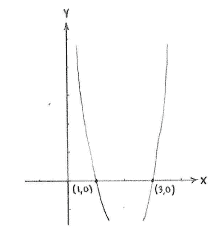Solution 2.3:9c
From Förberedande kurs i matematik 1
(Difference between revisions)
m |
|||
| (3 intermediate revisions not shown.) | |||
| Line 1: | Line 1: | ||
| - | { | + | To determine all the points on the curve <math>y=3x^{2}-12x+9</math> which also lie on the ''x''-axis we substitute the equation of the ''x''-axis i.e. <math>y=0</math> in the equation of the curve and obtain that ''x'' must satisfy |
| - | < | + | |
| - | {{ | + | {{Displayed math||<math>0 = 3x^{2}-12x+9\,\textrm{.}</math>}} |
| - | [[ | + | |
| + | After dividing by 3 and completing the square the right-hand side is | ||
| + | |||
| + | {{Displayed math||<math>x^{2}-4x+3 = (x-2)^{2} - 2^{2} + 3 = (x-2)^{2} - 1</math>}} | ||
| + | |||
| + | and thus the equation has solutions <math>x=2\pm 1,</math> | ||
| + | i.e. <math>x=2-1=1</math> and <math>x=2+1=3\,</math>. | ||
| + | |||
| + | The points where the curve cut the ''x''-axis are (1,0) and (3,0). | ||
| + | |||
| + | |||
| + | [[Image:2_3_9_c.gif|center]] | ||
Current revision
To determine all the points on the curve \displaystyle y=3x^{2}-12x+9 which also lie on the x-axis we substitute the equation of the x-axis i.e. \displaystyle y=0 in the equation of the curve and obtain that x must satisfy
| \displaystyle 0 = 3x^{2}-12x+9\,\textrm{.} |
After dividing by 3 and completing the square the right-hand side is
| \displaystyle x^{2}-4x+3 = (x-2)^{2} - 2^{2} + 3 = (x-2)^{2} - 1 |
and thus the equation has solutions \displaystyle x=2\pm 1, i.e. \displaystyle x=2-1=1 and \displaystyle x=2+1=3\,.
The points where the curve cut the x-axis are (1,0) and (3,0).

